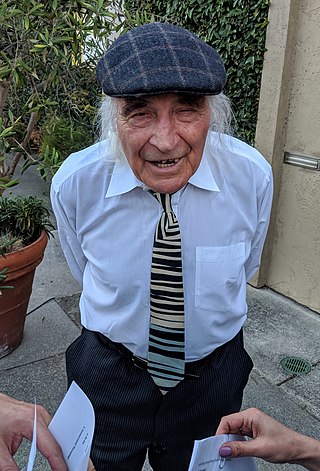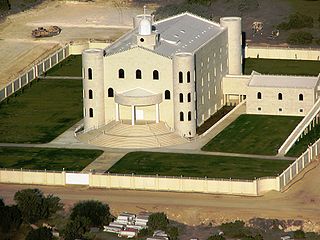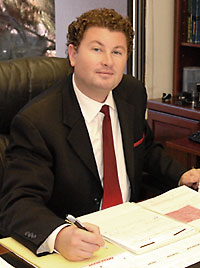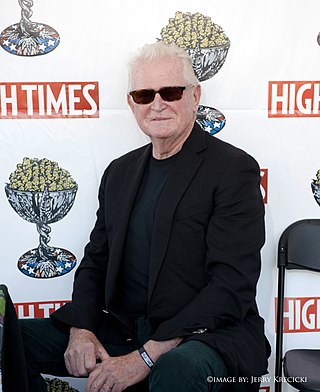Related Research Articles

Osiel Cárdenas Guillén is a Mexican drug lord and the former leader of the Gulf Cartel and Los Zetas. Originally a mechanic in Matamoros, Tamaulipas, he entered the cartel by killing Juan García Abrego's friend and competitor Salvador Gómez, after the former's arrest in 1996. As confrontations with rival groups heated up, Osiel Cárdenas sought and recruited over 30 deserters from the Grupo Aeromóvil de Fuerzas Especiales to form the cartel's armed wing. Los Zetas served as the hired private mercenary army of the Gulf Cartel.

Joseph Tony Serra is an American civil rights attorney, activist and tax resister from San Francisco.

The Gulf Cartel is a criminal syndicate and drug trafficking organization in Mexico, and perhaps one of the oldest organized crime groups in the country. It is currently based in Matamoros, Tamaulipas, directly across the U.S. border from Brownsville, Texas.

Tom DeLay, a Republican U.S. Representative from Texas from 1979–83, and from 1985–2006 and the House Majority Leader from 2003–05, was convicted in 2010 of money laundering and conspiracy charges related to illegal campaign finance activities aimed at helping Republican candidates for Texas state office in the 2002 elections. In 2013, a Texas Court of Appeals panel acquitted DeLay when it overturned his conviction. This decision was affirmed by the Texas Court of Criminal Appeals on October 1, 2014. DeLay had three years from that date, i.e. until October 1, 2017, to file any lawsuits for wrongful action.

The Yearning for Zion Ranch, or the YFZ Ranch, was a 1,700-acre (690-hectare) Fundamentalist Church of Jesus Christ of Latter-Day Saints (FLDS) community of as many as 700 people, located near Eldorado in Schleicher County, Texas, United States. In April 2014, the State of Texas took physical and legal possession of the property.

Norman Elliott Kent was an American criminal defense attorney, publisher, and radio talk show host.

Joseph Yves Limantour was a French merchant who engaged in the California sea trade during the years preceding American occupation of that Mexican province in 1846. He was also known in California as José Limantour.

Jeralyn Elise Merritt is an American criminal defense attorney in private practice in Denver, Colorado, since 1974. She served as one of the trial lawyers for Timothy McVeigh in the Oklahoma City bombing case in 1996 and 1997. In 2002 Merritt founded and is the principal author of the blog TalkLeft: The Politics of Crime. She also serves as a legal commentator for news media programs and as an internet journalist.
A criminal defense lawyer is a lawyer specializing in the defense of individuals and companies charged with criminal activity. Some criminal defense lawyers are privately retained, while others are employed by the various jurisdictions with criminal courts for appointment to represent indigent persons; the latter are generally called public defenders. The terminology is imprecise because each jurisdiction may have different practices with various levels of input from country to country. Some jurisdictions use a rotating system of appointments, with judges appointing a private practice attorney or firm for each case.

Juan García Abrego is a Mexican convicted drug lord and former leader of the Gulf Cartel, a criminal group based in the state of Tamaulipas, Mexico. He started in the cartel under the tutelage of his uncle Juan Nepomuceno Guerra.

Manuel Flores served as a volunteer in the Texas army in 1835–1838. Fighting and commanding, he rose through the ranks to reach sergeant status during the fight for Texas independence and was commissioned a captain during the Republic years.
Ewing Werlein Jr. is a senior United States district judge of the United States District Court for the Southern District of Texas.

Jason Scott "Jay" Leiderman was an American criminal defense lawyer based in Ventura, California. The Atlantic Magazine called Leiderman the "Hacktivist's Advocate" for his work defending hacker-activists accused of computer crimes, or so-called "Hacktivism" especially people associated with Anonymous. BuzzFeed called Leiderman "The Maserati-Driving Deadhead Lawyer Who Stands Between Hackers And Prison" and stated he was "A medical marijuana and criminal defense lawyer from Southern California [who] has made himself into the country's leading defender of hackers."

On August 15, 2014, Texas Governor Rick Perry was indicted by a Travis County grand jury, but has since been cleared on all charges. The first charge of the indictment was abuse of official capacity, a first-degree felony, for threatening to veto $7.5 million in funding for the Public Integrity Unit, a state public corruption prosecutors department. The second charge, which has since been ruled unconstitutional, was coercion of a public servant, a third-degree felony, for seeking the resignation of Travis County District Attorney Rosemary Lehmberg, a Democrat, after she was convicted of drunk driving and incarcerated. Lehmberg was a district attorney in Travis County, Texas, and the Travis County DA's office managed the Public Integrity Unit's operations. The veto was seen as retribution for Lehmberg not stepping down. Perry pleaded not guilty to both charges.

John Stevens Berry Sr. is an American attorney and the founder of Berry Law Firm in Lincoln, Nebraska. He is notable for a number of high-profile cases including the defense of Green Berets in Vietnam.
Don Pumphrey, Jr. is a Tallahassee, Florida-based criminal defense attorney, former state prosecutor, law enforcement officer, and former NFL player.

Gilberto García Mena, also known as El June, is a Mexican convicted drug lord and former high-ranking member of the Gulf Cartel, a criminal group based in Tamaulipas, Mexico. He began his criminal career as a small-time marijuana smuggler in his teens, and later joined the Gulf Cartel under kingpin Juan García Ábrego. García Mena was arrested by U.S. authorities in Texas while possessing marijuana in 1984, but was released without a conviction. He returned to Mexico, and established a center of operations in Nuevo León. García Mena was arrested on drug-trafficking charges in 1989, but authorities were again unable to convict him. Released in 1990, he rejoined the Gulf Cartel.
Líctor Hazael Marroquín García was a Mexican criminal and convicted vehicle thief. He was the best friend of drug kingpin Juan García Abrego, the former leader of the Gulf Cartel, a criminal group based in Tamaulipas, Mexico. In 1978, Marroquín García was indicted by the U.S. District Court of the Southern District of Texas in Brownsville for transporting stolen vehicles from the U.S. into Mexico. He was charged along with seventeen other people, including García Abrego, who was a low-level criminal at that time. Convicted in 1979, Marroquín García had his sentence suspended and was deported back to Mexico. He died of cirrhosis in 1985.

Michael John Kennedy was an American criminal defense attorney, expert in U.S. Constitutional law, and a civil rights advocate who defended cases for the American Civil Liberties Union (ACLU), the Center for Constitutional Rights (CCR), the National Emergency Civil Liberties Committee (NECLC) and in his private practice. Kennedy, who tried cases in 36 states, was a member of the National Lawyers Guild and the State Bar in California and New York.

José Abrego was a 19th-century Californian merchant. He arrived in Alta California in 1834 as a member of Compania Cosmopolitan A, part of the Hijar-Padrés colony. It was led by José Maria Hijar and Don José Maria Padrés. Abrego became a merchant in Monterey, California, and held a variety of political offices. He served as treasurer of the territory from 1839 to 1846. After the Mexican–American War, he continued to operate as a merchant. He became very wealthy and built a home that is still preserved in Monterey.
References
- 1 2 Gordon, Stephen H. “Gerry Goldstein, for the Defense.” San Antonio Lawyer. March–April 2013. Pg. 5
- 1 2 3 4 Neil, Martha (Apr 11, 2008). "Meet Gerry Goldstein, Lawyer for Polygamy Sect in Texas Ranch Raid". ABA Journal.
- 1 2 3 4 Anderson, Patrick. “High in America: The True Story Behind NORML and the Politics of Marijuana.” Viking Press. 1981. Chapter 15.
- 1 2 3 4 5 6 Swartz, Mimi. “The High Times of Gerry Goldstein” Texas Monthly. April 1996
- ↑ Gonzalez, John (April 26, 2014). "40 years later, S.A.'s racy Deep Throat case recalled".
- ↑ Cockburn, Alexander (1998). Whiteout: The CIA, Drugs and the Press. Verso Publisher. pp. 361. ISBN 1-85984-139-2.
- ↑ "U.S. Jury Convicts Mexican on Drug Charges". New York Times. 17 October 1996.
- 1 2 Vine, Katy. “Fundamental Arguments.” Texas Monthly. November 2009
- ↑ "USA Patriot Act and the Attack on the 5th Amendment Right to Counsel". Goldstein, Goldstein, Hilley & Orr. Retrieved 2018-10-16.
- ↑ "Gerald H. Goldstein". Goldstein & Orr. Retrieved 9 September 2024.